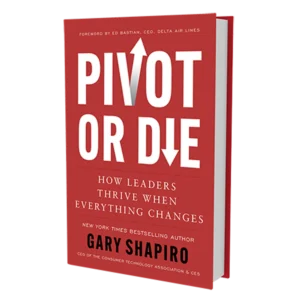Podcast: Play in new window | Download
 For over 40 years, Gary Shapiro has been CEO of the Consumer Technology Association – the organization which runs CES, the world’s largest and most influential technology trade show held every year in Las Vegas. CES long ago became the global stage where innovations like the iPhone, self-driving cars, and AI breakthroughs have been introduced to the world for the first time.
For over 40 years, Gary Shapiro has been CEO of the Consumer Technology Association – the organization which runs CES, the world’s largest and most influential technology trade show held every year in Las Vegas. CES long ago became the global stage where innovations like the iPhone, self-driving cars, and AI breakthroughs have been introduced to the world for the first time.
In his spare time, Gary has written four New York Times bestsellers, including the focus for this episode, his new book, Pivot or Die: How Leaders Thrive When Everything Changes.
As you will hear, Gary emphasizes that pivoting is the cornerstone of effective leadership in today’s fast-moving world. Mastering this skill, he stresses, is critical to staying relevant, inspiring teams, and driving success in an era where resistance to change can be fatal.
So, what exactly is pivoting? In Gary’s view, it’s a bold, intentional shift in strategy or direction when the future is unclear. It’s not just about savvy business choices—it’s about summoning the courage to act decisively amid uncertainty, whether you’re a startup disrupting markets or a seasoned leader tackling unforeseen challenges. His insights, honed over decades watching tech giants like Netflix and PayPal pivot to redefine industries, offer essential guidance for leaders navigating today’s unpredictable landscape.
 During our conversation, we dive into how leaders can pivot effectively. Importantly, Gary stresses that relying upon data alone to inform our decision-making proves to be massively flawed. Instead, he says leaders must cultivate – and trust – their intuition as well. His book cites studies that show blending intuition with data leads to both faster and better decisions.
During our conversation, we dive into how leaders can pivot effectively. Importantly, Gary stresses that relying upon data alone to inform our decision-making proves to be massively flawed. Instead, he says leaders must cultivate – and trust – their intuition as well. His book cites studies that show blending intuition with data leads to both faster and better decisions.
When Netflix made the bold leap from DVD rentals to streaming, Gary calls this a textbook pivot that redefined an industry. But as cautionary tales on what happens when companies fail to pivot, 3-in-4 startups fail to repay their investors, and half of small businesses collapse within five years. The common thread among survivors? A relentless willingness to adapt, evolve – and intentionally pivot. And, for workplace leaders, this means staying open to new paths while keeping goals in sight, even when it feels risky.
Truth be told, pivoting isn’t always easy. As just one example, we discuss what Gary calls the “success pivot,” where leaders choose to abandon what’s working (and profitable) to seize even bigger wins or embrace market evolution.
As you’ll also hear, Gary’s leadership philosophy is humanistic. He says his career’s greatest lesson is to treat employees as human beings, not capital. He believes when people are valued and cared for, they become far more willing to embrace change and help leaders quickly move in a new direction. And Gary’s parting words serve as a rallying cry: in a world moving at breakneck speed, leaders who don’t pivot risk obsolescence.




